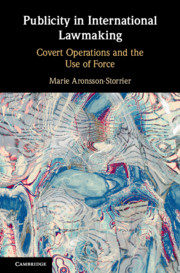Book contents
- Publicity in International LawMaking
- Publicity in International LawMaking
- Copyright page
- Contents
- Acknowledgements
- 1 Introduction
- 2 The Use of Force and the Scope for Dynamic Development
- 3 Customary International Law and the Requirement of Publicity
- 4 Quasi-Covert Operations and the Identification of Claims
- 5 Unacknowledged Operations
- 6 Concluding Remarks
- Index
5 - Unacknowledged Operations
Published online by Cambridge University Press: 21 January 2021
- Publicity in International LawMaking
- Publicity in International LawMaking
- Copyright page
- Contents
- Acknowledgements
- 1 Introduction
- 2 The Use of Force and the Scope for Dynamic Development
- 3 Customary International Law and the Requirement of Publicity
- 4 Quasi-Covert Operations and the Identification of Claims
- 5 Unacknowledged Operations
- 6 Concluding Remarks
- Index
Summary
This chapter demonstrates how covert operations differ significantly in their level of publicity, and range from acts that remain secret, to acts that are the object of debates amongst states, legal scholars, and civil society, in and outside the settings of international organisations. It is demonstrated that unacknowledged acts can affect the law in different ways depending on their level of publicity and covertness. It will also be shown that the necessity of the involvement of states in a debate around an operation can vary depending on the rule that it is informing. An unacknowledged act leading to extensive academic debate might prove very informative and play an important role in updating the already vague definition of ‘force’ in light of technological developments, but it would not have the same effect if arguing for a right to preventive self-defence against non-imminent threats, where states have been more active in the debate. It is further argued that the absence of states from certain events and debates opens up more influential participation by other international actors, such as legal scholars and other groups of experts.
Keywords
- Type
- Chapter
- Information
- Publicity in International LawmakingCovert Operations and the Use of Force, pp. 130 - 161Publisher: Cambridge University PressPrint publication year: 2020

